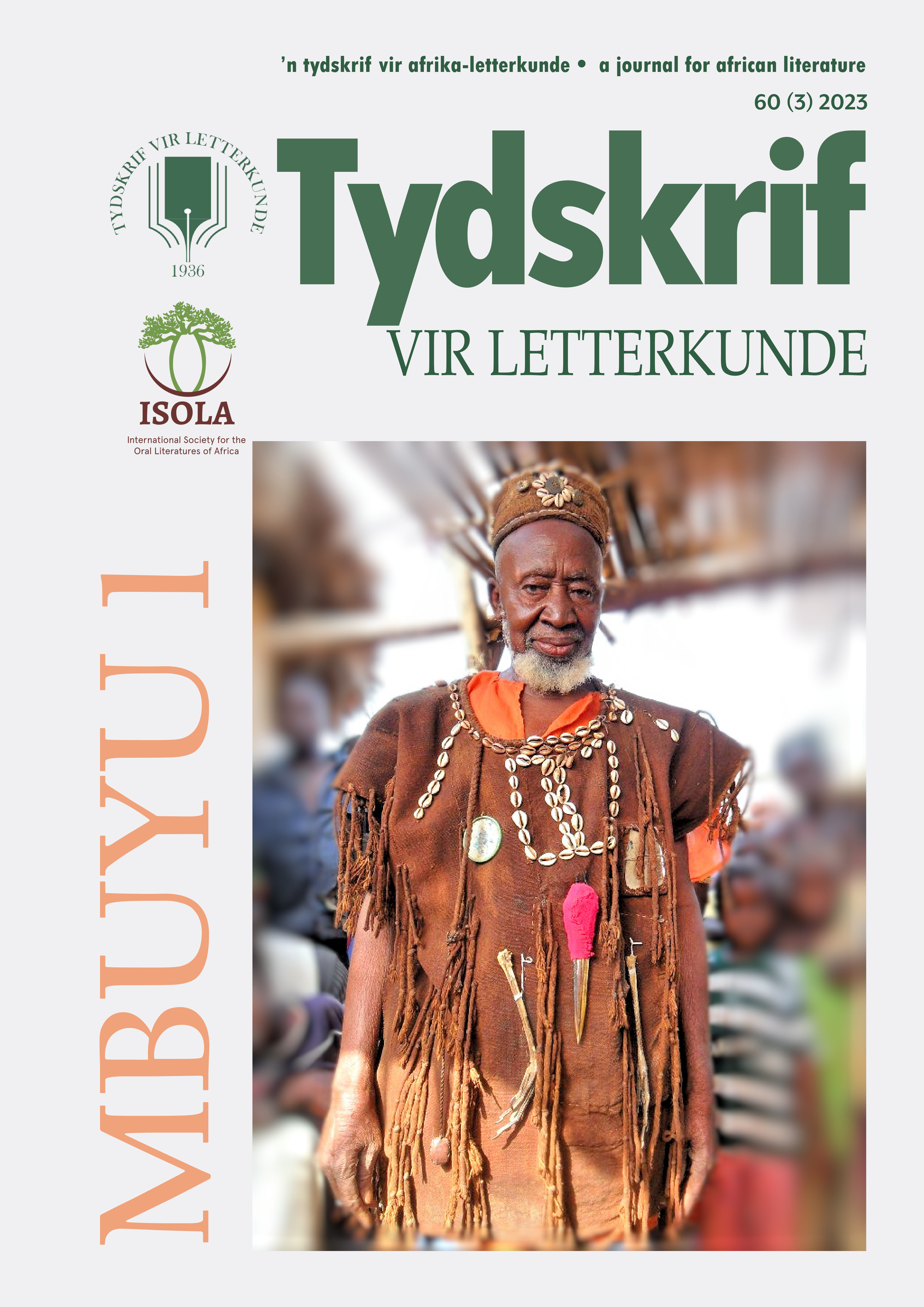The state of Hausa children’s folktales and play-songs in Gombe, Nigeria
DOI:
https://doi.org/10.17159/tl.v60i3.14451Keywords:
children’s literature, folktales, play-songs, globalisation, cultauritureAbstract
In this paper I investigate the state of Hausa children’s folktales and play-songs in Gombe, Nigeria to ascertain whether they (folktales and play-songs of children) are still alive and active in this culturally important town in northern Nigeria. My specific objectives are to examine how much parents and their children know of Hausa children’s folktales and play-songs and argue that folktales and play-songs are to some extent infused with modern technologies because of globalisation and that mass media has taken over the dissemination of such cultures. To achieve this aim, I employ questionnaires as the instrument of data collection. The subjects for the research are 150 parents and their school-going and out-of-school children aged 20-above and 0–10 respectively. Arguing that globalisation impacts the oral transmission of cultural knowledge more than ever, I adopt technauriture and cultauriture as the theoretical models. Analysis of the data reveals a more than 90% awareness of folktales and play-songs from all respondents. However, some school-going children prefer to watch such oral traditions via satellite rather than listening to a narration as it enhances their language development and nurtures and preserves culture using the paradigm of technology with audio-visual media. The out-of-school children, on the other hand, listen to the narration but are not captivated by it because it only uses the oral means of dissemination. They prefer to watch television and play video games as this educates and entertains using technology, orality, and visuals.
Downloads
References
Abba, Sani, et al. Gombe State: A History of the Land iand the People. Ahmadu Bello U P, 2000.
Ajayi, Ademola S. “The Concept of Culture.” African Culture and Civilization, edited by S. Ademola Ajayi. Atlantis, 2005, pp.1–11.
Amali, I. Halima. “The Function of Folktales as a Process of Educating Children in the 21st Century: A Case Study of Idoma Folktales.” International Conference on 21st Century Education at Dubai Knowledge Village vol. 2, no. 1, 2014, pp. 88–97.
Arawa, Abdullahi Abubakar. “The Imposition of British Colonial Rule and the Establishment of Native Authority Administrative System in Gombe Emirate 1902–1954.” MA Thesis. Gombe State U, 2018.
Ashimole, Elizabeth O. “Nigerian Children’s Literature and the Challenges of Social Change.” Children and Literature in Africa, edited by Chidi Ikonne, et al. HEBN P, 2011, pp. 70–81.
Ayodabo, Sunday Joseph. “Culture and Igbo Notions of Masculinity in Nigerian Children’s Literature.” Tydskrif vir Letterkunde vol. 58, no. 2, 2021, pp. 38–46. DOI: https://doi.org/10.17159/tl.v58i2.8804. DOI: https://doi.org/10.17159/tl.v58i2.8804
Bilton, Tony. Introductory Sociology. Macmillan, 1997. DOI: https://doi.org/10.1007/978-1-349-24712-7
Buhari, A. “The Impact of Globalization on Fulani Culture: A Study of TV Satellite Programme.” MA Thesis. Gombe State U, 2012.
Diala-Ogamba, Blessing. “A Study of Archetypal Symbols in Selected Igbo Folktales.” Children’s Literature & Story-telling, edited by Ernest N. Emenyonu. Boydell & Brewer, 2015, pp. 54–68. DOI: https://doi.org/10.1017/9781782046028.007
Eze, Dons. “Nigeria and the Crisis of Cultural Identity in the Era of Globalization.” Journal of African Studies and Development vol. 6, no. 8, 2014, pp. 140–7. DOI: https://doi.org/10.5897/JASD2014.0292. DOI: https://doi.org/10.5897/JASD2014.0292
Fanon, Franz. Toward the African Revolution. Grove, 1967.
Felix, Akaayar Ahokegh. “Globalization and the Emerging Cultural Order in Nigeria.” Journal of Globalization and International Studies vol. 5, no. 1&2, 2010, pp. 1–8.
Finnegan, Ruth. Oral Literature in Africa: World Oral Literature Series: Volume 1. Open Book, 2012. DOI: http://dx.doi.org/10.11647/OBP.0025. DOI: https://doi.org/10.11647/OBP.0025
Flint, D. “Why National Pride Still Has a Home in the Globalization Village.’’ Globalization Policy Forum. 18 May 2002. https://archive.globalpolicy.org/globaliz/cultural/2002/0318pride.htm.
Giddens, Anthony. The Consequence of Modernity. Stanford U P, 1990.
Gombe, Alhaji, et al. History of Gombe Emirate: Documentation of Oral Sources. E-Concept, 2016.
Iwoketok, Enobong Uwemedimo. “Childlore: A Bottom-Up Perspective to Literary Studies and Orature.” Inaugural lecture. 11 Dec. 2014, U of Jos, Nigeria.
Jungudo, Mohammed Maryam. “Fulani Culture in a Changing World.” Indigenous and Native Studies, edited by J. W. D. Somasundara. Samanala Educational Centre, 2015, pp. 144–55.
Kaschula, Russell. “Oral Literature in Africa.” Journal of African Cultural Studies vol. 25, no. 1,2013, pp. 141–4. DOI: https://doi.org/10.1080/13696815.2012.756804. DOI: https://doi.org/10.1080/13696815.2012.756804
Kaschula, Russell & Andre Mostert. “From Oral Literature to Technauriture: What’s in a Name.” World Oral Literature Project, U of Cambridge, 2011.
Mostert, Andre, et al. “From Technauriture to Cultauriture: Developing a Coherent Digitisation Paradigm for Enhancing Cultural Impact.” International Journal of Society, Culture & Language vol. 5, no. 2, 2017, pp. 37–48.
Muleka, Joseph Mzee & Julius Kanyari Mwangi, eds. The Folktale Revisited. Asis, 2020.
Onukaogu, Abalogu Allwell & Ezechi Onyerionwu. 21st Century Nigerian Literature: An Introductory Text. Kraft, 2009.
Sackeyfio, Rose. “Culture and Aesthetics in Selected Children’s Literature.” Children’s Literature & Story-telling, edited by Ernest N. Emenyonu. Boydell & Brewer, 2015, pp. 6–16. DOI: https://doi.org/10.1017/9781782046028.003
Downloads
Published
Issue
Section
License
Copyright (c) 2023 Tydskrif vir Letterkunde

This work is licensed under a Creative Commons Attribution-ShareAlike 4.0 International License.


 https://orcid.org/0000-0001-6465-6584
https://orcid.org/0000-0001-6465-6584


.png)